前景使用英语综合教程1 Unit 2Food 教案
前景实用英语综合教程1 Unit 1教案
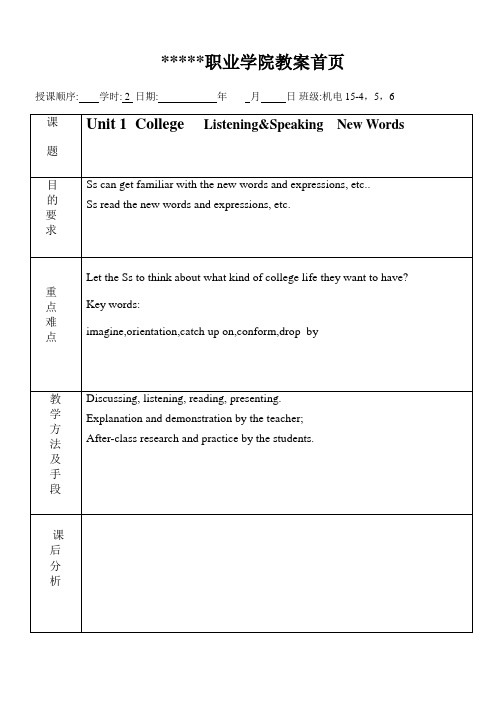
*****职业学院教案首页授课顺序: ___ 学时: 2 日期:___________ 年 ___ 月 ____ 日班级:机电15-4,5,6…………………装……………订……………线………………………教案稿纸化工职业学院第页…………………装……………订……………线………………………教案稿纸化工职业学院第页…………………装……………订……………线………………………教案稿纸化工职业学院第页…………………装……………订……………线…………………教案稿纸化工职业学院第页教案稿纸化工职业学院第页教案稿纸化工职业学院第页内蒙古化工职业学院教案首页授课顺序: _2_ 学时: 2 日期:___________ 年 ___ 月 ____ 日班级:机电15-4,5,6教案稿纸Teaching procedures: Step 1Listen to the tape and read the words and phrases,review the usages of the word.Step 2 Discussion:How do you feel about your beginning of the college life?Step 3 Listen to the tape and underlined the key words and expressions. Step 4 Intensive Reading of Text A.The Freshman Experience: College Is Not Summer CampBy Kristine Wellesley1. The first week of college is summer camp. The second is back to reality. When I arrived on campus a little over a week ago, I never imagined going from name games to essays in a blink.summer camp:夏令营 arrive on 到达 back to reality:回归现实Imagine doing sth.想象做某事I never imagined going from name games to essays in a blink.2.…… so it never really felt like school until I walked intoGeology on Tuesday morning. Before that, I had been watching movies with other freshmen, exploring—well, really getting lost in the campus, and trying every imaginable ice cream combination at the dining halls. Never…until…(never本身是否定 VS.not…until)Had been过去完成时(以过去为基点,发生在之前的事情)filled with strangers作为过去分词短语修饰room3.And then came the terrible syllabus, something I’ve never used before.化工职业学院第页教案稿纸化工职业学院第页…………………装……………订……………线………………………教案稿纸内蒙古化工职业学院第页职业学院教案首页授课顺序: _3_ 学时: 2 日期:___________ 年 ___ 月_____ 日班级:机电15-4,5,6…………………装……………订……………线………………………教案稿纸化工职业学院第页教案稿纸化工职业学院第页教案稿纸化工职业学院第页。
新编实用英语综合教程2第五版unit2food答案

新编实用英语综合教程2第五版unit2food答案1、--It is Sunday tomorrow, I have no idea what to do.--What about _______? [单选题] *A. play computer gamesB. go fishingC. climbing the mountain(正确答案)D. see a film2、36.This kind of bread is terrible. I don't want to eat it ______. [单选题] *A.any more(正确答案)B.some moreC.no longerD.some longer3、51.People usually ________ the prices before they buy something. [单选题] * A.receiveB.payC.spendD.compare(正确答案)4、My friend and classmate Selina()running in her spare time. [单选题] *A.likeB. likes (正确答案)C. is likedD. is liking5、( ) She keeps on learning English all the time. So far, she______three books of New Concept English. [单选题] *A. has learned(正确答案)B. have learnedC. had learnedD. learn6、Look! There are some boats ______ the river.()[单选题] *A. on(正确答案)B. overC. betweenD. in7、My father can?_______ a little English. [单选题] *A. speak(正确答案)B. sayC. talkD. tell8、If you do the same thing for a long time, you'll be tired of it. [单选题] *A. 试图B. 努力C. 厌倦(正确答案)D. 熟练9、Nick got out of bed and _______ a shower. [单选题] *A. practicedB. took(正确答案)C. didD. made10、—What were you doing when the rainstorm came?—I ______ in the library with Jane. ()[单选题] *A. readB. am readingC. will readD. was reading(正确答案)11、There are trees on both sides of the broad street. [单选题] *A. 干净的B. 狭窄的C. 宽阔的(正确答案)D. 宁静的12、The blue shirt looks _______ better on you than the red one. [单选题] *A. quiteB. moreC. much(正确答案)D. most13、Alice is a ______ girl. She always smiles and says hello to others.()[单选题] *A. shyB. strictC. healthyD. friendly(正确答案)14、5.Shanghais is known ________ “the Oriental Pearl”, so many foreigners come to visit Shanghai very year. [单选题] *A.forB.as (正确答案)C.withD.about15、My watch usually _______ good time, but today it is five minutes fast. [单选题] *A. goesB. makesC. keeps(正确答案)D. gains16、( ) What she is worried __ is ____ her daughter is always addicted to chatting online./; that [单选题] *A /; thatB of thatC about that(正确答案)D about what17、Some students are able to find jobs after graduation while _____will return to school for an advanced degree. [单选题] *A. otherB. anotherC. others(正确答案)D. the other18、53.On your way home, you can buy some fruit, meat, vegetables and ________. [单选题] * A.something else(正确答案)B.else somethingC.everything elseD.else everything19、80.Thousands of ________ from other countries visit the village every year. [单选题] * A.robotsB.postcardsC.tourists(正确答案)D.bridges20、He has made a lot of films, but ____ good ones. [单选题] *A. anyB. someC. few(正确答案)D. many21、2.The villagers want to have a bridge. Can this dream ________? [单选题] * A.come outB.get awayC.come true(正确答案)D.get out22、_______, Mr. Smith. [单选题] *A. Here your tea isB. Here is your tea(正确答案)C. Here your tea areD. Here are your tea23、Tony is a quiet student, _______ he is active in class. [单选题] *A. soB. andC. but(正确答案)D. or24、The Titanic is a nice film. I _______ it twice. [单选题] *A. sawB. seeC. have seen(正确答案)D. have saw25、( ) They have_____ useful dictionary. They want to lend it___ us. [单选题] *A. an; forB. a; fromC. an; toD. a; to(正确答案)26、He has bought an unusual car. [单选题] *A. 平常的B. 异常的(正确答案)C. 漂亮的D. 废弃的27、The red jacket is _______ than the green one. [单选题] *A. cheapB. cheapestC. cheaper(正确答案)D. more cheap28、I hope to see you again _______. [单选题] *A. long long agoB. long beforeC. before long(正确答案)D. long29、—______ Tom play the piano?—Yes, very well. ()[单选题] *A. Can(正确答案)B. MayC. MustD. Should30、Just use this room for the time being ,and we’ll offer you a larger one _______it becomes available [单选题] *A. as soon as(正确答案)B unless .C as far asD until。
实用英语综合教程1_unit3

Unit 3 Gifts
Warm-up Listening and Speaking Text A Grammar Tips Text B Comprehensive Exercises Practical Reading and Writing
《实用综合教程(第二版)》第1册电子教案
Unit 3 Gifts
实用综合教程第二版第1册电子教案对某物或某事要适度bemodestwith葡萄酒winen
Unit 3 Gifts
Objectives In this unit, you will — get to know the rules of gift giving; — learn how to say and receive thanks;
《实用综合教程(第二版)》第1册电子教案
Unit 3 Gifts
Background Information
Discussion
Question 1: All of us must have sent gifts to or received them from our friends, family members, relatives, etc. What is the most memorable gift you have sent or received?
《实用综合教程(第二版)》第1册电子教案
Unit 3 Gifts
Background Information
Discussion
When to give gifts? In China the occasions requiring gifts and presents mainly include friends’ birthday parties, wedding ceremonies, baby showers, and visiting old people, especially during festivals, or visiting sick friends or relatives. Westerners may give gifts on any occasion, and the following situations are where gifts and presents are necessary: weddings, Christmas, birthdays, wedding anniversaries, house-warming parties, baby showers, graduation, etc.
前景基础英语第一册教案(Unit1-1-10)2012.3.5
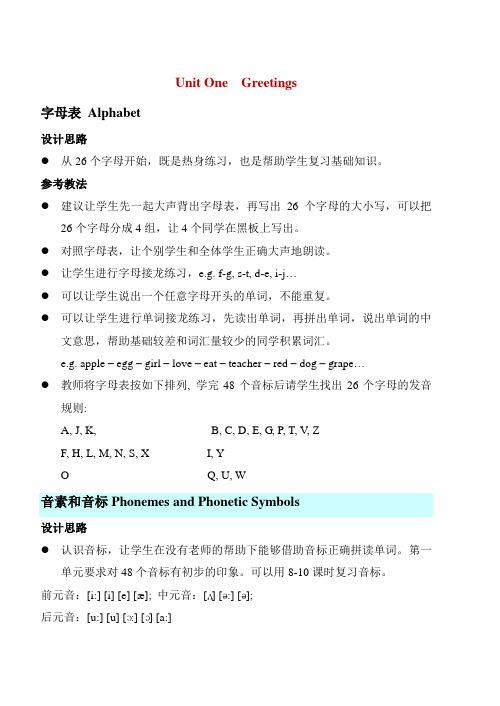
Unit One Greetings字母表Alphabet设计思路●从26个字母开始,既是热身练习,也是帮助学生复习基础知识。
参考教法●建议让学生先一起大声背出字母表,再写出26个字母的大小写,可以把26个字母分成4组,让4个同学在黑板上写出。
●对照字母表,让个别学生和全体学生正确大声地朗读。
●让学生进行字母接龙练习,e.g. f-g, s-t, d-e, i-j…●可以让学生说出一个任意字母开头的单词,不能重复。
●可以让学生进行单词接龙练习,先读出单词,再拼出单词,说出单词的中文意思,帮助基础较差和词汇量较少的同学积累词汇。
e.g. apple – egg – girl – love – eat – teacher – red – dog – grape…●教师将字母表按如下排列, 学完48个音标后请学生找出26个字母的发音规则:A, J, K, B, C, D, E, G, P, T, V, ZF, H, L, M, N, S, X I, YO Q, U, W音素和音标Phonemes and Phonetic Symbols设计思路●认识音标,让学生在没有老师的帮助下能够借助音标正确拼读单词。
第一单元要求对48个音标有初步的印象。
可以用8-10课时复习音标。
前元音:[i:] [i] [e] [æ]; 中元音:[ʌ] [ə:] [ə];后元音:[u:] [u] [ɔ:] [ɔ] [a:]合口双元音:[ei] [ai] [ɔi] [əu] [au]; 集中双元音:[iə] [εə] [uə]爆破音:[p] [t] [k] ; [b] [d] [g]摩擦音:[f] [s] [ʃ] [θ] [h]; [v] [z] [ʒ] [ð]破擦音:[tʃ] [tr] [ts]; [dʒ] [dr] [dz]鼻辅音:[m] [n] [ŋ]舌边音:[l] [l] [r] 半元音:[w] [j]参考教法●建议先了解学生的音标基础。
新标准大学英语 综合教程1 笔记unit2
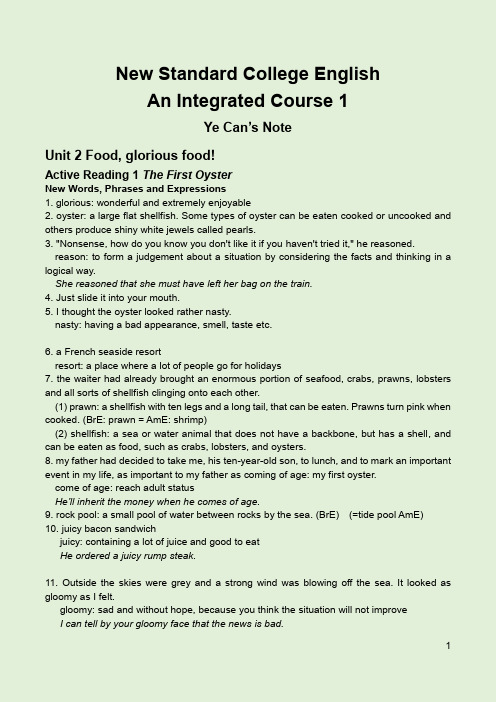
New Standard College EnglishAn Integrated Course 1Ye Can’s NoteUnit 2 Food, glorious food!Active Reading 1 The First OysterNew Words, Phrases and Expressions1. glorious: wonderful and extremely enjoyable2. oyster: a large flat shellfish. Some types of oyster can be eaten cooked or uncooked and others produce shiny white jewels called pearls.3. "Nonsense, how do you know you don't like it if you haven't tried it," he reasoned. reason: to form a judgement about a situation by considering the facts and thinking in a logical way.She reasoned that she must have left her bag on the train.4. Just slide it into your mouth.5. I thought the oyster looked rather nasty.nasty: having a bad appearance, smell, taste etc.6. a French seaside resortresort: a place where a lot of people go for holidays7. the waiter had already brought an enormous portion of seafood, crabs, prawns, lobsters and all sorts of shellfish clinging onto each other.(1) prawn: a shellfish with ten legs and a long tail, that can be eaten. Prawns turn pink when cooked. (BrE: prawn = AmE: shrimp)(2) shellfish: a sea or water animal that does not have a backbone, but has a shell, and can be eaten as food, such as crabs, lobsters, and oysters.8. my father had decided to take me, his ten-year-old son, to lunch, and to mark an important event in my life, as important to my father as coming of age: my first oyster.come of age: reach adult statusHe’ll inherit the money when he comes of age.9. rock pool: a small pool of water between rocks by the sea. (BrE) (=tide pool AmE)10. juicy bacon sandwichjuicy: containing a lot of juice and good to eatHe ordered a juicy rump steak.11. Outside the skies were grey and a strong wind was blowing off the sea. It looked as gloomy as I felt.gloomy: sad and without hope, because you think the situation will not improveI can tell by your gloomy face that the news is bad.12. striking a note of compromiseTo strike a note of something means to speak in a particular manner or tone.compromise: an agreement made between two people or groups in which each side gives up some of the things they want so that both sides are happy at the end13. the clear perception14. On his plate was a pile of discarded lobster claws, and alongside was a battery of implements used to crack the shells, and scrape out every last piece of meat.(1) discard: get rid of sth. because it is uselessdiscard an old pair of shoes / discard old beliefs(2) a battery of: a group of many things or people of the same typea battery of medical tests(3) implement: a tool or instrument, especially a fairly large one with no motor, especially one used for outdoor physical workagricultural implements15. He paused every mouthful and raised his glass. Now and then he waved the oyster at me, teasing me to eat it.(1) mouthful: an amount of food or drink that you put into your mouth at one timeHe took a mouthful of sweet country air.I'm so full I couldn't eat another mouthful.handful: the amount of sth that can be held in one handarmful: a quantity that you can carry in one or both arms(2) now and then: at times, occasionally(3) tease: to laugh at someone and make jokes in order to have fun by embarrassing them, either in a friendly way or in an unkind wayShe used to tease me about my hair.16. I just looked at my empty plate in despair.despair: a feeling that you have no hope at all for the futureDefeat after defeat filled us with despair.17. a silent tear slid down my cheek.slid: pt of slide18. I knew it was all over.19. I took it between a finger and thumb, and held it to my lips.20. I did as I was told.21. The oyster was slippery.slippery: difficult to hold or to stand on or walk on, because it is smooth, wet or greasy.slippery like a fishThe road was slippery after the rain.22. half smilingKey Words1. portionn.(1) a part of something larger, especially a part that is different from the other partsThe factory represents only a small portion of the company’s interests.The rent on his portion of the apartment was $500 a month.The front portion of the rocket breaks off.(2) an amount of food for one person, especially when served in a restaurantShe cut the cake into six small portions.a huge portion of roast beefHe served generous portions of soup from the pot.(3) a share of something, such as responsibility, blame, or a duty, that is divided between a small number of peopleThe other driver must bear a portion of the blame for the accident.2. clingv.(1) to stick to someone or something, to fit very tightly on somethingHis wet shirt clung to his body.(2) to hold someone or something tightly, especially because you do not feel safesurvivors clinging to a raftcling to old ideasShe clung to the hope that her son was not dead.3. perceptionn.(1) the way that you notice things with your senses of sight, hearing etcvisual perceptionHis perception of the change came in a flash.(2) the natural ability to understand or notice things quicklyHis analysis of the problem showed great perception.(3) the way you think about something and your idea of what it is likeParents’ views influence their children’s perceptions of the world.public perception of the police / doctorThere is a general public perception that…4. crackvt./vi.to break or to make something break, either so that it gets lines on its surface, or so that it breaks into piecesHe cracked a couple of eggs into a pan.He has cracked a bone in his arm.Don’t put boiling water in the glass or it will crack.Concrete is liable to crack in very cold weather.Her lips were dry and cracked.5. scrapev.(1) to remove something from a surface by moving sth sharp and hard like a knife across itScrape the carrots and slice them thinly.(2) to rub against a rough surface by accident so that it causes slight damage or hurtI must have scraped some of the paint off when I was parking the car.She fell and scraped her knee.Notes1. district / region / vicinity / area,这一组名词都有“区域”的意思。
全新版大学英语综合教程第1册第2单元教案

全新版大学英语综合教程第1册第2单元教案Unit TwoFriendship教学目标:通过本单元的学习,掌握英文书信的写作技巧和方法,在生活中学会珍惜友情.教学重点:掌握单词;available estimate correspondence practicallyurge postpone reference reunion awful skip掌握词组;be lost in or something go ahead not much oflose touch on one's mind come up hang outchoke up教学难点:1.to grasp the main idea (never delay expressing your true feelingsto a friend) and structure of the text (developing a story arounda letter);2.to appreciate that spoken English is much more informal thanwritten English;3.to master key language points and grammatical structure in thetext;课时分配:1.Pre-Reading Tasks,New Words Explanation and Analysis 2学时2.While-Reading T asks and Analysis 4学时3.Post-Reading Tasks and Exercises 1学时4.Home-Reading Check up 1学时课外练习:1.Vocabulary;PartI II III 2.Structure;PartI II 推荐读物:<<大学英语>>第一册第二课教学过程:Study of the TextCulture NotesHalloween is celebrated annually. It is on the night of 31 October, when people once believed that ghosts could be seen. Now, in Britain and America, it is a time when children have parties, dress up as witches, make lanterns out of pumpkins from which the inside has been removed, and play "trick or treat'.Trick or treat is a traditional activity at Halloween. Children dress in costumes and visit houses. At each house they say "Trick or treat'. This means that they will play a "trick', or joke, on the people in the house unless they are given a "treat', e.g. sweets or money. Most people prefer to give treats rather than having tricks playedon them.Pre-reading tasks1.T asks Ss the following questions on the song That's What Friends are For;---What is a fair weather friend?(one who is happy to stay with you when things are going well but leaves as soon as trouble arrives)---According to the song, what are friends for?(for both good times and bad times) 2.Warm-up QuestionsDo you often write letters to friends?1)T writes down the following words on the blackboard: frequently, sometimes rarely, never.2)T invites several Ss to give reasons for writing or not writing letters.3)T sums up by saying: letters are the best in expressing our innermost feelings.3.Topic-related Prediction1)Before you read the story, think about the answers to the following questions.What does a cabbie do?What is a letter used for?Who wrote the letter to the cabbie?Why was all the cabbie had only a letter?2)Read the last sentence of Text A and try to guess what the story is about. While-reading tasks1.Read Text A as quickly as possible, and find out if you are right. Can you summarize the story with three sentences?key words: lost in thought, read a letter, an old friend, lifelong friendship, regret, author decided2.Scan the text and find out how many questions the narrator asked the cabbie and what were the latter's responses.----At first, did you mistake Ed for the writer of this letter?----Which round of question-and-answer leads to the mistake?(the second round)3.Ss do Text Organization exercise on page 40./doc/1714972056.html,nguage study and text analysis1)be lost in/lose oneself in:be absorbed in, be fully occupied withe .g: He was lost in playing computer games so he was unaware of my entering the room.I had lost myself in thought.2)available: able to be used, had, or reachede.g. Since 1990, the mount of money available to buy books has fallen by 17%.We have already used up all the available space.3)He sounded as if he had a cold or something: This sentence implies the sad state mind the taxi driver was in.or something: used when you are not very sure about what you have just saide.g. The air fare was a hundred and ninety-nine pounds or something.Here's some money. Get yourself a sandwich or something.4)go ahead: continue, begin(sometimes followed by with + n)e.g. The board of directors will vote today on whether to go ahead with theplan.Henry will be late but we will go ahead with the meeting anyway.5)know/learn by heart: memorize, remember exactlye.g. You have to know all the music by heart if you want to be a concertpianist.The pupils are required to learn a classic poem by heart every day.6)At least they do with me because I'm on the road so much: At least lettersfrom home mean a lot to me because I travel a lot in a car for long distances.7)estimate: form a judgement about (a quantity or value)e.g. I estimate that the total cost for the treatment of the disease will gofrom$5,000 to $8,000.Bill's personal riches were estimated at $368 million.8)This isn't family.: This isn't a letter from my family.9)might/may(just) as well: not have a strong desire to do and may even slightlyreluctant about somethinge.g. Anyway, you're here; you might as well stay.The post office is really busy --we'll have to queue for ages to getserved. We might as well go home.10)I'm not much of a hand at writing.: I am not good at writing.not much of a: not a goode.g. Some people may think that doing housework for others is not much of acareer.He is not much of a father, but he is an outstanding professor.11)keep up: continue without stoppinge.g.: They risk losing their homes because they can no longer keep up therepayments.I was so hungry all the time that I could not keep the diet up for longerthan a month.12)correspondence: a)the act of writing, receiving or sending letters(不可加s, often followed by with + n)e.g. His interest in writing came from a long correspondence with a close friend.b)the letters that sb. receives or sendse.g. Mary really never mentions her step-mother in her correspondence.13)But I take it he's someone...:But I expect that he issomeone...e.g.: I take it(that) you've heard that all the students in my class have done a very good job in CET Band 4.14)practically: almost, but not completely or exactlye.g.: He'd known the old man for practically ten years.I know people who find it practically impossible to give up smoking.15)Went to school together? The complete sentence is like this: You went to schooltogether?(In colloquial English a declarative sentence with a rising tone may serve as a question.)16)neighborhood: one of the parts of a town where people livee.g.: It seemed like an ideal neighborhood to raise my children in.Houses in a good neighborhood are likely to be sold at a high price.17)kind of/sort of:("kind of”is esp.AmE, "sort of' esp.BrE) a little bit, in some way or degree(used before v. or after a link verb)e.g.: She wasn't beautiful. But she was kind of cute.The boy's description kind of gives us an idea of what's happening.18)lose touch(with sb.):meet or contact sb. less and less often, gradually stop writing,telephoning, or visiting theme.g.: I lost touch with my former classmates after graduation.In my job one tends to lose touch with friends19)a couple of:(infml)a few, more than one but not manye.g. Do you have a moment? There are a couple of things I'd like to talk to youabout.They promised the students that they would find a substitute teacher in acouple of days.20)But I realized that Old Ed was still on his mind when he spoke again, almost moreto himself than to me.: But I realized that the taxi driver was still thinking ofOld Ed when he spoke again. It seemed that he spoke more to himself than to me.on one's mind: in one's thoughts; of concern to one(If something is on your mind,you are worried or concerned about it and think about it a lot.)e.g.: Dealings on the stock market have been on his mind all the time.This travel plan has been on my mind all week.21)keep in touch(with sb): write, phone, or visit each other regularlye.g. The old man kept in touch with his children while living in a nursing house.While doing the research work in the antarctic, the professor kept in touch with his students via email.22)come up: a)happen, occur, esp. unexpectedlye.g.: "Sorry, I am late----something came up at home.'b)be mentioned or discussede.g.: The term "Project Hope' has come up a lot recently in the newspapers.23)urge: try very hard to persuade(often used in the pattern urge sb. to do sth.or followed by a that-clause. In the that-clause, "should' or the base form ofa verb is used.)e.g.: They urged the local government to approve plans for their reformprogramme.Sir Fred urged that Britain(should) join the European Monetary System.24)postpone: delay(usu. followed by n./gerund)e.g.: The couple had postponed having children to establish their careers.The Russian experts postponed dumping Mir(和平号Russia's space station)in the Pacific Ocean until March 23,2001.25)It had references to things that...:The letter made mention of things that...reference: a)the act of talking about sb./sth.,or mentioning them(usu. followedby to)e.g.: It was strange that he made no reference to any work experience in hisresume.b)the act of looking at sth. for informatione.g.: Keep their price list for further reference.26)"Like it says there,”..."About all we had to spend in those days was time.”: "Asthe letter says there,”..."though we didn't have much money we had a lot of free time.”27)absolutely: totally and completelye.g. Funding is absolutely necessary if research is to continue.There is absolutely no difference between the two oil-paintings.28)reunion: a party attended by members of the same family, school,or othergroup who have not seen each other for a long timee.g.: The soccer club holds an annual/yearly reunion.Before she went abroad for further study, the whole family had a big family reunion.29)...there are fewer and fewer still around.:...fewer and fewer of us are left alive.30)hang out: a)(infml: used mainly in AmE) stay in or near a place, for no particularreason, not doing very muche.g.: I often hung out in coffee bars while I was unemployed.b)hang clothes on a piece of string outside in order to dry theme.g.: What a pain!--It's raining and I've just hung the washing out.31)every now and then: sometimes, at timese.g.: Every now and then I have a desire to quit my tedious job.I still see Jane for lunch every now and then, but not as often as I used to.32)But for the last 20 or 30 years it's been mostly just Christmas cards.:But generally speaking we have sent only Chrismas cards to keep in touch with each other for the last 20 or 30 years.mostly: almost all; generallye.g.: They have invested their money mostly in expensive realestate.The guests at the wedding party are mostly friends of the bride.33)Your friendship over the years has meant an awful lot to me, more than I can say because I'm not good at saying things like that.: Your friendship over the years has been very important to me, more important than I can say because I'm not good at expressing my feelings.awful:(infml; used to add force) very great; very bad or unpleasante.g.: I have got an awful lot of work to do.I can't bear the awful smell of cigarette smoke.34)choke up: become too upset to speake.g.: When he learned the news of his friend's sudden death, he was so choked uphe couldn't say a thing.Losing my job left me completely choked up; I was so upset that I didn't know what to do.35)destination: the place to which sb. is going or being sente.g. Singapore is still our most popular holiday destination.Only half of the emergency supplies have reached their destination because of the bad weather.36)skip: pass from(one point, etc.) to another, disregarding or failing to act on whatcomes betweene.g.: The teacher skipped chapter five and said it wouldn't be on the test."As time is limited, we will have to skip some of the exercises in Unit 10,' said the teacher.37)right away: (infml)at oncee.g.: Tom has got a high fever; he should go and see a doctor right away.I wrote him a letter and posted it right away.5.What was the lesson the storyteller learned from the cabbie?(Never delayexpressing one's true feelings to one's friend.)6.T reads out the following sentences and Ss try to find out sentences ofsilmilar meaning in the text:---Go on reading your letter.(Go ahead and finish your letter.) ---I'm not used to writing letters.(I'm not much of a hand at writing.)---We were friends since our childhood. So our friendship has a long history.(We were kids together, so we go way back.)---For one reason or another you lose touch even though you never forget.(Youkind of lose touch even though you never forget.)---It is painful to lose any friend.(It's no fun to lose any friend.) T explains that since this story is developed mainly through the conversation between the cabbie and his passenger, it's language tends to be simpler and more colloquial, sentences tend to be shorter or even incomplete.Post-reading tasks1.T guides Ss through some after-text exercises.2.T checks on Ss' home reading(Text B).3.Ss do Part IV: Theme-related Language Learning Tasks.。
Unit 2新视界大学英语综合教程1
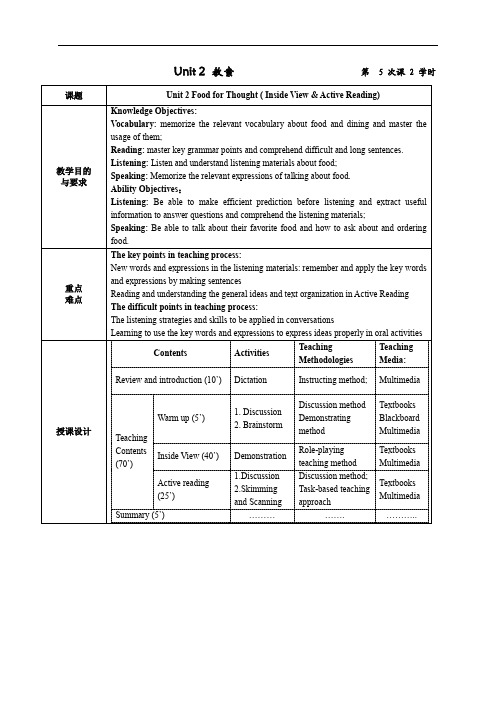
Speaking: Memorize the relevant expressions of talking about food. Ability Objectives:
Listening: Be able to make efficient prediction before listening and extract useful
food.
The key points in teaching process:
New words and expressions in the listening materials: remember and apply the key words
and expressions by making sentences
Textbooks Blackboard Multimedia
Demonstration
1.Discussion 2.Skimming and Scanning
………
Role-playing teaching method Discussion method; Task-based teaching approach
Before we listen in class, we usually make predictions by looking at the photos and any other illustrations (such as the picture above), and think about: - What are the three people doing in the picture? - What do you think they will decide to order? b. Watch the video twice and finish exercises 2 and 3. (P15) Listening tips: Listen for Keywords Use keywords or key phrases to help you understand the general ideas. This may seem obvious to you, but remember that understanding the main idea will help you to understand the detail as the person continues to speak. c. Learn some new words from the listening materials [e.g. spicy, raw, oven…] d. Teacher makes an introduction of cultural points [about restaurants in Britain and the US, and the meals] Conversation 2: a. Students get familiar with the new words in conversation 2 b. Ask students to listen to the conversation 2 one time and then answer the questions in exercise 5. c. Then listen to the conversation 2 again and then complete the sentences. d. Watch the video and check the answers. Oral Activities Work in groups of three and make dialogues about ordering food (Exercise 8, P17) Ask students to prepare a role-play, making use of the expressions they have just learned. Remind students that the aim of this activity is to practice speaking English and expand their vocabulary by using some of the words and phrases they have heard in the conversations. a. Discussbers, find out the meanings of the expressions in
综合教程第二版第一册Unit 2
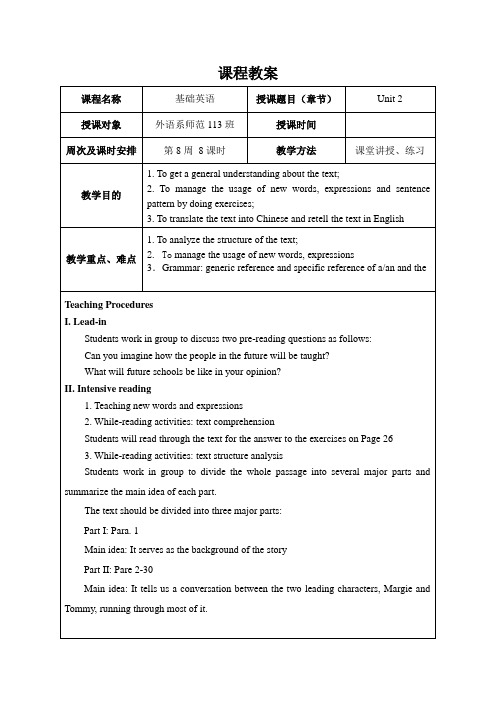
The text should be divided into three major parts:
It’s all ready and I’ll get you something to eat in no time.
都准备好了,我马上给你们弄点吃的。
We’ll have that leak fixed in no time.
superior:Derivation:superiorityn.
1)adj. better than average or better than other people or things of the same type; higher in rank or social position than others
He is scornful of the greed of others.
他看不惯别人的贪心。
mechanical:adj.
1) of or moved, worked, or produced by machinery
The new car had to be withdrawn from the market because of a mechanical defect.
If a lawyer has plenty of clients, he grows rich.
律师如果有大量的诉讼委托人,就会财源不断。
A growing child needs plenty of sleep.
- 1、下载文档前请自行甄别文档内容的完整性,平台不提供额外的编辑、内容补充、找答案等附加服务。
- 2、"仅部分预览"的文档,不可在线预览部分如存在完整性等问题,可反馈申请退款(可完整预览的文档不适用该条件!)。
- 3、如文档侵犯您的权益,请联系客服反馈,我们会尽快为您处理(人工客服工作时间:9:00-18:30)。
化工职业学院教案首页
授课顺序: 5 学时: 2 日期:___________ 年 ___ 月 ____ 日班级:机电15-4,5,6
教案稿纸
教案稿纸
…………………装……………订……………线………………………
教案稿纸
化工职业学院第页
化工职业学院教案首页
授课顺序: _5_ 学时: 2 日期:___________ 年 ___ 月 ____ 日班级:机电15-4,5,6
……………装……………订……………线………………………
教案稿纸
Teaching procedures: Step 1 Listen to the tape and read the words and phrases,review the usages of the word.
Step 2 Discussion:
What kind of food do you like best? Why?
Step 3
Listen to the tape and underlined the key words and expressions.
Step 4 Intensive Reading of Text A.
1.However, while enjoying their free college life, they often end up
suffering from poor eating habits that lead them to put on weight ……while 与此同时 end up 以…为结局 lead to 导致
put on weight 体重增加 while的用法 task 6
2.They eat too much junk food and they have too many
alcoholic drinks which are filled with empty calories and help contribute to a worsening diet.
too many/too much 分别跟复数和不可数名词
which are filled with……定语从句,用来说明junk food和alcoholic drinks
empty calories 无营养价值 contribute to….&lead …to…
contribute to….助长,加剧促成某事的原因
e.g.The stress of losing his job contributed to his death.
lead to sth 导致,引发促成某事的结果
e.g.Living in damp conditions can lead to sevious health problems.
3.Many of these students will then go on a diet to lose weight. ……Thus they fall into a cycle of losing weigh……This up-and-down weight loss is unhealthy for the body and the heart.
化工职业学院第页
…………………装……………订……………线………………………
教案稿纸
内蒙古化工职业学院教案首页
授课顺序: _6_ 学时: 2 日期:___________ 年 ___ 月_____ 日班级:机电15-4,5,6
…………………装……………订……………线………………………
教案稿纸
…………………装……………订……………线………………………
教案稿纸
……………装……………订……………线………………………
教案稿纸
第页
教案稿纸
化工职业学院第页
教案稿纸
化工职业学院第页
前景实用英语综合教程1
教案
( 2015-2016第一学期)。
